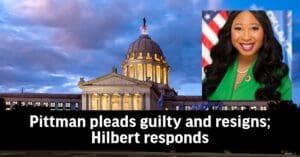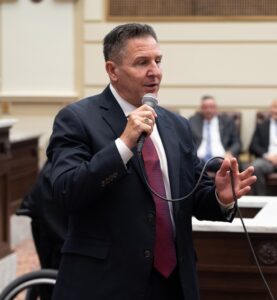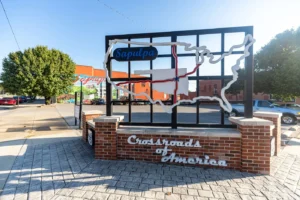Attorney General Gentner Drummond made Sapulpa a stop on his “listening tour,” part of a strategy to get out of the Capitol and meet the people affected by the policies of the current state administration. At a gathering on Monday July 17th evening at Waypoint Lounge, he reiterated the need for transparency at the state level in government.

“As a business lawyer, I always resented the statewide elected officials because they never got outside of Oklahoma City or Tulsa. It’s important that I take back the tendency in Oklahoma City to think that the whole world revolves right around 23rd and Lincoln, and this echo chamber evolves and people only listen to the echo and don’t listen to people that are actually out there doing.”
In a room filled with first responders, school administrators, city officials, and county officials, Drummond found a good mix of folks to talk to and to listen to.
Drummond told the attendees about how his family came to Osage County, and how he ended up in the Air Force, though he knew he wouldn’t be a career officer in the military.
“In that eight years, I got grounded seven times as a fighter pilot. Most pilots can get grounded once or twice. I knew the writing was on the wall,” he said.
Drummond says he’s the same way as an elected official. “I don’t obey very well. I’ll probably never get reelected, but in the meanwhile, I’m going to do the very best I can.”
Even though Drummond says he and Governor Stitt have known each other for years, he says the two of them “could not be further apart on the issue of the Native American working relationship.”
“I as a 28-year attorney don’t see any utility in holding my breath and pounding the table and stomping my foot and hoping the Supreme Court will listen to me and be sympathetic to change the law or that the US Congress will.”
Drummond said the 2018 McGirt ruling is based on a law that had been around for 100 years but hasn’t been enforced until recently. That has been “a train wreck, but we’re going to work through that.”
He also addressed the new Hooper ruling, which says that cities that issue traffic tickets to Native Americans could no longer do so. “That’s very frustrating, but our reality is we must find a solution,” he says. “The Supreme Court will not fix it. Federal Legislation will not fix it. Oklahomans must fix it.”
He continued by reminding the audience that all Oklahomans want the same thing. “I will tell you this without any equivocation, the leaders of the Muscogee Creek Nation want bad people prosecuted and good people protected,” he said. “We have had 120 years as a state to get it right on the prosecution of people. The Muscogee police have had four years so it’s nascent, it’s brand new, but we’re going to work toward an agreement. I’ve been in office six months, three and a half years to go. And I promise you, we will have a solution during my tenure on Native American law.”
Drummond then turned to the explosion of cannabis grows as a result of medical marijuana becoming legal at the state level in 2018.
“We let the cannabis industry come in and suggest rules that were promulgated, and then what happened was with insufficient braking mechanisms on the cannabis industry, we went from zero grows to 12,000 grows in about nine months,” Drummond said. “Now it’s circulated back down to 6,299 grow operations as of last Friday,” Drummond says that of those 6,299 grows, he believes at least 3,000 of them are illegal.
Drummond says the high rate of illegal cannabis farms makes it more difficult for those who are going about it within the law.
According to Drummond, a legal cannabis grower has a cost of about $600 per pound of marijuana, with the average legal market rate being about $800, or just $200 with which to pay their payroll and other expenses. On the other hand, an illegal grow has a cost of just $200 and on the black market, their product can be worth up to $1200 on average.
Drummond praised the recent legislative session that empowered the Attorney General’s office to combat this rise of illegal growing. As a result, “non-traditional” landowners will be required to post a $50,000 bond, so should that grower be found to be illegal and shut down, that $50,000 bond gets used to rehabilitate the property.
Drummond maintains that Oklahoma’s exportation of medical marijuana needs to be reigned in.
“The three largest grow operations in Oklahoma provide enough marijuana for every medical marijuana cardholder to consume three cannabis products every day of the year. Clearly, we have an oversupply of marijuana,” he said. “If you were on the streets of New York today and you bought a joint of marijuana, the likelihood of it being an Oklahoma-grown marijuana product is 40%. We export to New York City 40% of their marijuana. it’s amazing.”







